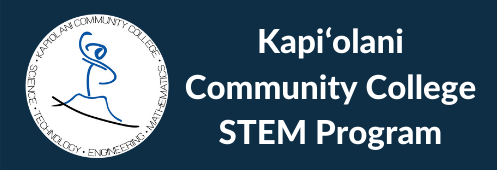External Funding
The KCC STEM Program has been supported by the National Science Foundation and NASA Space Grant since 2006.
The KCC STEM Program is currently supported by the National Science foundation with three student-focused grants:
The Bridge to the Baccalaureate (B2B) alliances, funded the Louis Stokes Alliances for Minority Participation (LSAMP) supports the development of comprehensive programs that facilitate the successful transfer of students historically underrepresented in STEM to four-year institutions in pursuit of STEM baccalaureate degrees. Specifically, the Hawai’i alliances focused on two strategies: undergraduate research experience, and mentoring.
This COMPLEAT project (Using Constructive Mathematics Pathways to Advance Preservice Elementary Teachers’ Learning) is led by DR. Sasha Wang from Boise State University and aims to serve the national interest by improving mathematics content courses for preservice elementary teachers (PSETs) to advance their 21st Century workforce skills as future teachers. This is a collaborative grant with Boise State University, Augusta University, University of Texas at San Antonio, and Kapi’olani Community College, all minority-serving institutions.
TAPDINTO-STEM is a national collaborative effort divided into 6 regional hubs involving 35 colleges and universities in 16 states,
Washington D.C., and the Northern Mariana Islands. This Collaboration is with Dr. Kiriko Takahashi from the University of Hawai’i at Mānoa and is part of the Islands Hub. This grant, led by Li-Anne Delavega at Kapi’olani, focuses on the unique issues faced by Indigenous and Pacific Island students with disabilities. The research conducted aimes at determining socio, cultural, personal, and historical factors that may facilitate or impede students’ interests and their identity development in STEM during the transition into or while in postsecondary education.
The University of Hawai’i (UH) Geopaths-Impact (GP-IMPACT) GEO Alliance partners share the common motivation to build systemic effective strategies to recruit, retain, (transfer) and graduate a professionally prepared geoscience workforce in Hawai’i and in the US. The key objective of this GEO Alliance is create a new, sustainable, articulated and purposeful multimodal pathway for undergraduate students with the goal of increasing the number and diversity of undergraduate students who enroll, persist in, and complete a degree program in the Geology, Environmental/Earth, and Ocean (GEO) sciences at the University of Hawai’i.
The University of Hawai’i (UH) Geopaths-Impact (GP-IMPACT) GEO Alliance partners share the common motivation to build systemic effective strategies to recruit, retain, (transfer) and graduate a professionally prepared geoscience workforce in Hawai’i and in the US. The key objective of this GEO Alliance is create a new, sustainable, articulated and purposeful multimodal pathway for undergraduate students with the goal of increasing the number and diversity of undergraduate students who enroll, persist in, and complete a degree program in the Geology, Environmental/Earth, and Ocean (GEO) sciences at the University of Hawai’i.
The S-STEM program, funded by the Division of Undergraduate Education (DUE), provides scholarships to encourage and enable low-income academically talented students with demonstrated financial need to graduate with an ASNS degree, transfer to a four-year institution in STEM and and graduate with a baccalaureate or a graduate degrees in S-STEM eligible disciplines. The program also supports the implementation and testing of existing effective evidence-based curricular and co-curricular activities.
The PEEC program funded by the Tribal Colleges and Universities Program (TCUP) from the Division of Human Resource Development (HRD) aims at supporting studies at PEEC institutions such as Kapiʻolani Community College, that investigate and elucidate the impact of the PEEC model, with the goal of understanding, documenting, and sharing the results of PEEC discovery.
